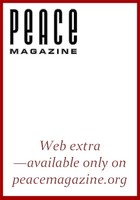
Peace Magazine Web extras 2012, page 1. Some rights reserved.
Search for other articles by Fredrik Heffermehl here
© March 2012 by Fredrik S. Heffermehl, Norwegian lawyer (LLM from NYU) and author
(fredpax@online.no – phone +47 917 44 783
A public authority in Sweden last week issued orders that the Stockholm-based Nobel Foundation must rein in and discipline the boards that select the winners of the five Nobel prizes established by the 1895 will of Swedish inventor and industrialist Alfred Nobel for the “greatest benefit to mankind.”
The order came as a result of a four years old dispute over how Norwegians have managed one of the five prizes, entrusted to them, the prize, not for “peace,” but for “the champions of peace.” This is not a mere subtlety in language, it contains the difference between a prize handed out in all directions for anything that can be termed peace in the widest possible sense, and the view that in order to thrive, prosper and survive humanity must demilitarize international relations, lift civilization, with rule of law and a prohibition against violence, to the global level. A good idea in 1895, a mandatory necessity in the nuclear age of 2012.
When Nobel entrusted this prize to the hands of a five-member committee appointed by the Norwegian parliament, the most probable cause was that Norway was a leading supporter of the peace movement of the period, of a peace vision where co-operation, trust and treaties should lay the basis for safe demilitarization of international affairs.
In his description of the peacemakers Nobel mentioned reduction or abolition of the military, and “to create a brotherhood of nations” based on trust, co-operation, international law and disarmament treaties. Nobel furthermore, confirmed the type of peacemakers he had in mind in a letter to Bertha von Suttner, the preeminent protagonist of peace of the period and a friend in the last 20 years of Nobel´s life.
The only thing that could be clearer than what winners Nobel had in mind is that the Norwegian trustees have taken total liberty to use the Nobel name and prestige for whatever they like, with no visible respect for the particular vision of peace Nobel wished to support. But for the Swedish authority to express strong condemnation of a fairly obvious violation of trust in this case seems to have been less than tempting. The criticism would hit an object of national pride, people in high places, politicians of a neighboring country.
The Swedish agency chose to blow the trumpet, but with mute. Its two-pages decision to dismiss the case did not express criticism of past awards, but instead specified a number of demands that the Nobel Foundation must work more seriously with. It ordered no less than a total overhaul to clarify what Nobel must have intended and describe the responsibilities and criteria as well as the routines for selections to ensure proper respect for the intentions of Nobel.
The tradition has been to consider the five awarding committees as fully independent. In its defense brief the Norwegian peace prize committee had claimed that in deciding on winners it is independent and shall take instructions from no one. This view was clearly rejected by the Swedish authority, which noted that under Swedish law the Stockholm-based Nobel foundation has the full and final control that winners comply with the will. It will not be entitled to pay out the prize money if the prizes are not within the scope of what Nobel intended when he wrote his will and may even require the Norwegian peace prize sub-committee to seek advance approval from Stockholm before deciding on the winner.
Nobel clearly wished the awarding committees to be specialists in their fields, The Caroline Hospital awards the Medecine prize, the Academy of Science the science prizes, The Swedish Academy the literature prize. The authority gently suggested that there may be persons better qualified to select the “champions of peace” in the sense that Nobel used the word than the present parliamentarians and that the Norwegian parliamentarians may have to pick such people – instead of placing themselves in the coveted seats.
The Swedish administrative authority was not tempted to reproach the Nobel prizes as the pride of Scandinavia nor the daunting line of winners, from Albert Schweitzer to Aung San Suu Kyi and Barack Obama. It chose to solve the dilemma by making clear demands for future work with the Nobel prizes but avoiding criticism of past performance.
Here is the translation of the response from the Nobel Foundation/Nobel committee to the Stockholm County board. Unfortunately there is at this point no translation of the decision that the Board handed down Wednesday. (But the Nobel Foundation should be asked to provide a translation of that too). http://www.nobelprize.org/press/nobelfoundation/press_releases/2012/statement.pdf

Peace Magazine Web extras 2012, page 1. Some rights reserved.
Search for other articles by Fredrik Heffermehl here